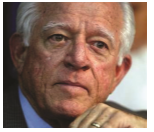NOTE FROM THE EDITOR
Dear readers:
Do you believe that politicians and big business work together to manipulate the people, and, that they sale themselves for a price, leaving out ethics and moral values for the sake of money?
According to investigative journalist, James Corbett, article (below), they do. He describes here how we are being lied to and they admit it. — Marvin Ramírez They know what you are (now they’re haggling over the price) by James Corbett There’s an old joke about a wealthy man talking to a famous actress. After asking her if she would sleep with a stranger for a million dollars she delivers an enthusiastic, “Yes!” He then inquires if she would do the same for five dollars. Offended, she fumes: “Five dollars? What kind of woman do you think I am?” “We’ve already established that,” the man rejoins.
“Now we’re just haggling over the price.” Although this joke probably doesn’t fly in today’s PC climate, we all get the point. The woman has already admitted that her principles are negotiable for the right sum. Determining the lower bounds of that sum, then, should not be inherently offensive. This may seem like just a crude joke, but it’s actually an insightful glimpse into the fundamental philosophical debate of our time—perhaps the fundamental philosophical debate of all time. And it helps us respond to the lockdowners, the anti-free speechers and other enemies of civilization with an answer that actually gets to the heart of the issue.
To really understand what’s going on here, we need to go back to one of the oldest pursuits known to man. No, not that pursuit! I’m talking about moral philosophy, of course, the attempt to differentiate right behavior from wrong behavior. Along with natural philosophy (the study of the natural world that we would today understand as “science”) and metaphysics (the study of existence, God, the mind and other abstract phenomena), moral philosophy (what we com monly refer to as “ethics”) forms one of the three main pillars of philosophy.
As such, it has been one of the most discussed and debated subjects in human history. How do we know right from wrong? How should we act in any given situation? What is the right way to live? These questions have been discussed for thousands of years, and the answers that have resulted from these debates have informed, explicitly or implicitly, almost every major social, political and religious movement in history.
In the Nicomachean Ethics, for example, Aristotle founded what is today known as “Virtue Ethics,” arguing that the ethical virtues were to be found in finding the “golden mean” between vices of excess and deficiency. Thus, courage is the balance between foolhardiness and cowardice, modesty is the virtue between shyness and boastfulness, etc. The Discourses of Epictetus outline the foundational ideas of the Stoic school, including the insight that happiness lies in controlling one’s reaction toward external events and on directing one’s attention to that which is within one’s power to control.
The Letter to Menoeceus, meanwhile, lays out the Epicurean form of hedonism, namely that pleasure is the highest good and the aim of life. (Spoiler: Epicurus’ understanding of “pleasure” is not the common one, eschewing drinking, debauchery and revelry in favour of “sober reasoning, searching out the motives for all choice and avoidance, and banishing mere opinions, to which are due the greatest disturbance of the spirit.”) There’s deontological ethical theories and divine command theories (or “theological voluntarism,” if you prefer), theories of ethical intuitionism, theories of anarchist morality and many, many more.
But at the risk of boring you to tears (or have I already done that?), let’s concentrate on two main camps in the ethical debate. On one side are the moral idealists—those who believe that there are objective moral standards (however understood) that are applicable in all circumstances. On the other side are the moral relativists—those who hold that there are no absolutes in the ethical arena, that what is “right” or “wrong” is always dependent on circumstance. Of course, these are huge categories and each one encompasses many schools of thought, but in the end the debate comes down to a core question: Are there moral absolutes, or can actions only be judged based on the surrounding circumstances? Answer this question wisely, because the implications of your answer may be much larger than you imagine. Take our hypothetical actress in the joke above, for example.
Her sense of the impropriety of prostitution (“What kind of woman do you think I am?”) is demonstrably not absolute; after all, she can be persuaded to engage in the act for the right sum of money. Her interlocutor, then, can correctly point out that she is, in fact, a prostitute. The only question is the sum of money that is necessary for her to overcome her moral qualms. In short, you don’t need a Ph.D. in philosophy to understand the horns of this particular dilemma.
Either you live by certain inviolable principles which you will not under any circumstances negotiate, or you don’t. Perhaps now you see why I brought the recent Question For Corbett about excess mortality down to the question of principle. How many dead bodies during a pandemic would it take for you to agree that your inalienable human rights are, in fact, alienable? If there is in fact a number of excess deaths at which you would concede the government has the right to lockdown cities and force vaccinate the population, then you are like the woman in the joke. The so-called “health authorities” know what you are. Now they’re just haggling over the price.
The utility of this framework for interrogating our own self-professed ideals and what they imply should be evident by now. Those who are crying for the state to come in and regulate Big Tech can’t claim to be offended when the state then tells Big Tech they have to purge COVID “disinformation” or other unapproved speech from their platform.
After all, they’ve already established what you are (a government interventionist), now they’re just haggling over the price. And is it OK for the government to tax your income by 1/10th of 1% in order to feed and clothe orphaned children? “Yes!” Then how about if they steal 99% of your income and use it to fund the military-industrial complex? “Heavens, no! That’s absurd!” But why are you so offended? They’re just haggling. You’re in favor of wearing masks and staying home for two weeks to flatten the curve during this deadly pandemic, aren’t you? Well how about if we force vaccinate you and institute a “health passport” system that will regulate your every movement and interaction for the rest of your life? Haggling. You see where this is going.
And you see why arguing with people about the terms of the situation that has convinced them to abandon their principle will not actually get to the root of the problem. The problem is that they are not arguing from principle. They have already admitted what they are. The only thing left is to haggle over their price. This is a deep and important topic, and should not be summed up tritely. There are many schools of thought making different arguments for consequentialist moral philosophy: utilitarianism, ethical pragmatism, situation ethics, etc.
These arguments are lightly dismissed at our peril, precisely because they have become the default mode of thinking for so many people. After all, how many people would answer differently than the woman in the joke if the price named was sufficiently high? How many people really do stand on principle and are unwilling to negotiate away their rights? How popular would it be to say that there are certain positions that are not negotiable under any conceivable circumstance? These are not simple questions, and we must confront them head on and articulate our positions on them before engaging others on these points.
But one other point to note from the joke is that the woman is offended by the implication that she is, in fact, a prostitute. One senses in her indignation the potential for a moment of self-realization, and that is perhaps the point to press. Like it or not, she’s just admitted to being a prostitute. The man is just haggling over the price. So rather than arguing numbers and figures with a committed COVID lockdowner, you might want to haggle with them over their price. This weekly editorial is part of The Corbett Report Subscriber newsletter.







